SPOTLIGHT OP ED
Treasury funding, outsourcing to private sector will address Gauteng’s oncology treatment backlog
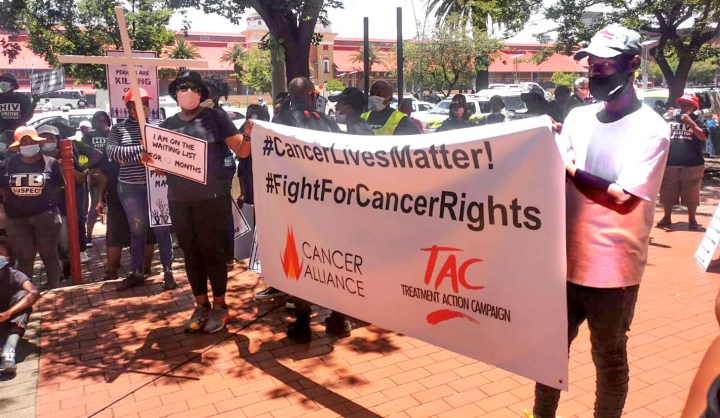
On 8 March, the Gauteng MEC for Finance, Jacob Mamabolo, delivered his budget speech in which he said that R784m had been set aside for the provincial health department to ‘address backlogs in surgical and radiation oncology services’ in Gauteng.
In a statement, we at SECTION27 welcomed this news and commended the Gauteng Treasury for the work and efforts towards making these funds available. In addition, there has also been an agreement to outsource some radiation oncology services to the private sector given the current lack of capacity in the public sector. Together, these developments are likely to save many lives.
How we got here
Since as far back as July 2020, the Cancer Alliance has raised the issue of the cancer treatment crisis at Charlotte Maxeke Johannesburg Academic Hospital (CMJAH) with the Gauteng Department of Health. On 17 July 2020, Cancer Alliance addressed a letter to the then acting minister of health, Mmamoloko Kubayi-Ngubane, expressing concerns over the growing number of cancer patients awaiting radiation oncology treatment in Gauteng.
This letter was met with silence.
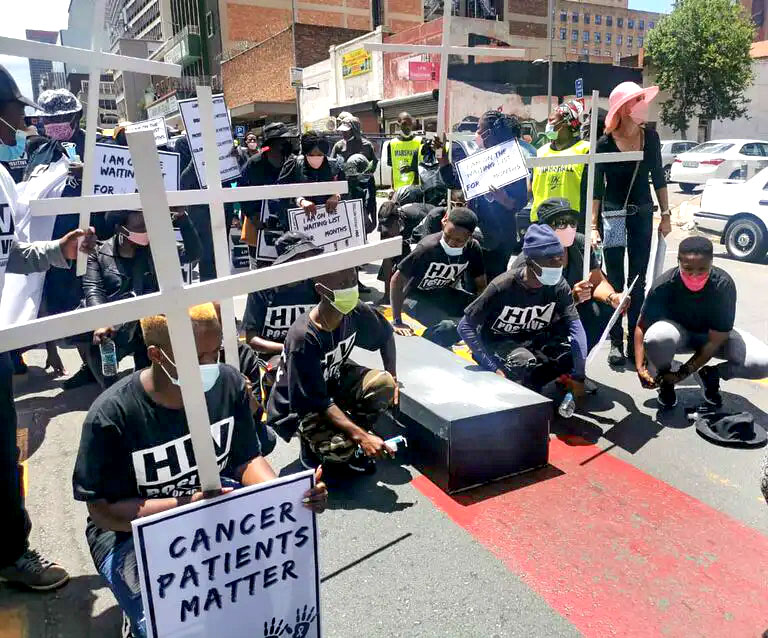
On 23 November 2021, Cancer Alliance and its partners SECTION27 and the Treatment Action Campaign held a protest at Charlotte Maxeke Johannesburg Academic Hospital and delivered a memorandum outlining their concerns. (Photo: SECTION27 and Cancer Alliance / Spotlight)
Again, on 12 July 2021, Cancer Alliance wrote a letter to the minister of health, once again expressing its concerns over the cancer treatment crisis in Gauteng — also with no response. On 23 November 2021, Cancer Alliance and its partners SECTION27 and the Treatment Action Campaign held a protest at CMJAH and delivered a memorandum outlining their concerns.
Undeterred by the lack of a response from the Gauteng Department of Health, Cancer Alliance addressed a letter of demand to the erstwhile MEC for health in the province, Dr Nomathemba Mokgethi. In this letter, Cancer Alliance demanded that the MEC establish a cancer crisis task team to deal with the issues.
Concerns over resources
The concerns raised in these letters related to the lack of resources, primarily radiation machines and radiation personnel. CMJAH previously had six radiation machines. Two of the six machines were decommissioned and have not been working for years. As a result, CMJAH is now down to four machines. This, while the backlog in radiation oncology patients awaiting treatment at Charlotte Maxeke Hospital is estimated at 2,500 at the time of writing. At Steve Biko Academic Hospital, the backlog was 526. These are the only two hospitals providing radiation oncology services in Gauteng.
Procurement to replace these two machines at CMJAH has been slow, particularly due to red tape and inefficiencies in the provincial health department.
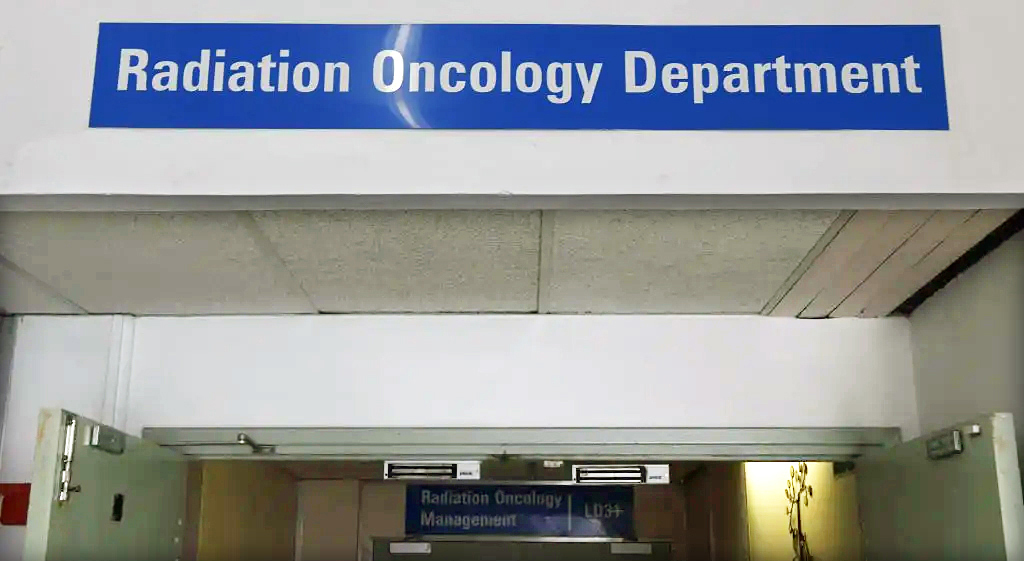
The Charlotte Maxeke Johannesburg Academic Hospital currently has 28 radiotherapists in its employ, while it requires 40 radiation therapists to meet the patient demand. (Photo: Nasief Manie / Spotlight)
For example, we understand from some staff members that the procurement of a brachytherapy machine for CMJAH started in 2019 and after three years the procurement process was derailed and the tender process was reinitiated in January 2022. Even then, the bid specification process (which is the initial stage of the procurement process) took nine months to complete in 2022.
This was the first step in a very long process.
Moreover, due to how expensive the machines are, the winning bidder will only start to manufacture the machines once an order is confirmed. The manufacturing process may take at least six months. Thereafter, the machines must be installed, inspected, and licensed. This process may take at least three months.
Therefore, from the conclusion of the tender process, which is nowhere in sight at the moment, it will still take at least nine months before the first patient can step into the machines and receive radiation oncology treatment. Despite this cost to patients, the provincial health department has been dragging its feet throughout this process.
In addition to the procurement, manufacturing, installation, and licensing of these new machines, the department must still remove the old machines and build new bunkers to fit the new machines. This process also requires a tender process, which has yet to begin.
Adding to this is the radiation personnel crisis. The CMJAH has 28 radiotherapists in its employ. The radiation oncology unit requires 40 radiation therapists to meet the patient demand. Contextually, radiotherapists are responsible for, among other things, creating individualised patient radiation plans. Together with the radiation oncologist, they map out where the radiation must be concentrated on the patient and advise on clinical tests which must be run given the patient’s comorbidities. They are essential to the process.
In addition, CMJAH only has five full-time radiation oncologists who are responsible for treating on average 4,000 new patients per year. According to the Atomic Safety Energy Standards, one radiation oncologist should only see 200 to 250 new patients a year. Ideally, the radiation oncology department at CMJAH requires 18 radiation oncologists (an additional 10) and an additional eight therapists to meet the demand.
In January 2022, the provincial health department advertised only four radiation oncologist positions for CMJAH. They also advertised three radiotherapist positions (when, in fact, they need an additional 26). None of these appointments was made.
The shortage in personnel and the reason for the limited uptake of advertised positions is due to the Occupation Specific Dispensation (OSD) for therapeutic, diagnostic and other related allied health professionals in Gauteng.
The requirements under the OSD for a radiotherapist to eventually be promoted to a radiation oncologist are onerous and uncompetitive with the private sector and other provinces.
Put simply, in Gauteng, if a radiotherapist has a goal to be promoted to radiation oncologist, they must first obtain a primary degree, then a specialist degree, and thereafter they must complete four years of diagnostic radiotherapy experience.
Meanwhile, in KwaZulu-Natal and the Western Cape, radiotherapists are only required to either have a specialist degree to be promoted to radiation oncologists or a primary degree and four years of diagnostic radiotherapy experience. As a result, Gauteng is bleeding radiation personnel.
The cancer crisis task team
On 23 March 2022, the then acting head of health in Gauteng, Dr Sibongile Zungu, established a cancer crisis task team, responsible for advising the head of department on the treatment of cancer patients in the province, overseeing concerns related to the Occupation Specific Dispensation of radiation oncology personnel, and to advise on the procurement processes of cancer equipment.
Meanwhile, Cancer Alliance commissioned an independent consultant to determine the actual number of people on the radiation oncology waiting list. This process was authorised by the CMJAH and included the perusing of the files in the radiation oncology unit, dividing the patients by type of cancer. The consultant concluded that there were on average 3,000 patients who had been awaiting radiation therapy for over a year.
According to oncology experts, radiation therapy cannot be substituted with any other type of cancer treatment. It is a necessary step in the treatment of cancer. Further, in terms of the Clinical Guidelines for Breast Cancer Control and Management and the Cervical Cancer Prevention and Control Policy (which are the only cancer guidelines in SA) issued by the National Department of Health, “Following surgery for breast cancer, the first adjuvant therapy (chemotherapy or radiation — depending on the patient’s treatment protocol) should occur within 60 days of surgery and no more than 90 days.”
Any delay beyond this risks recurrence.
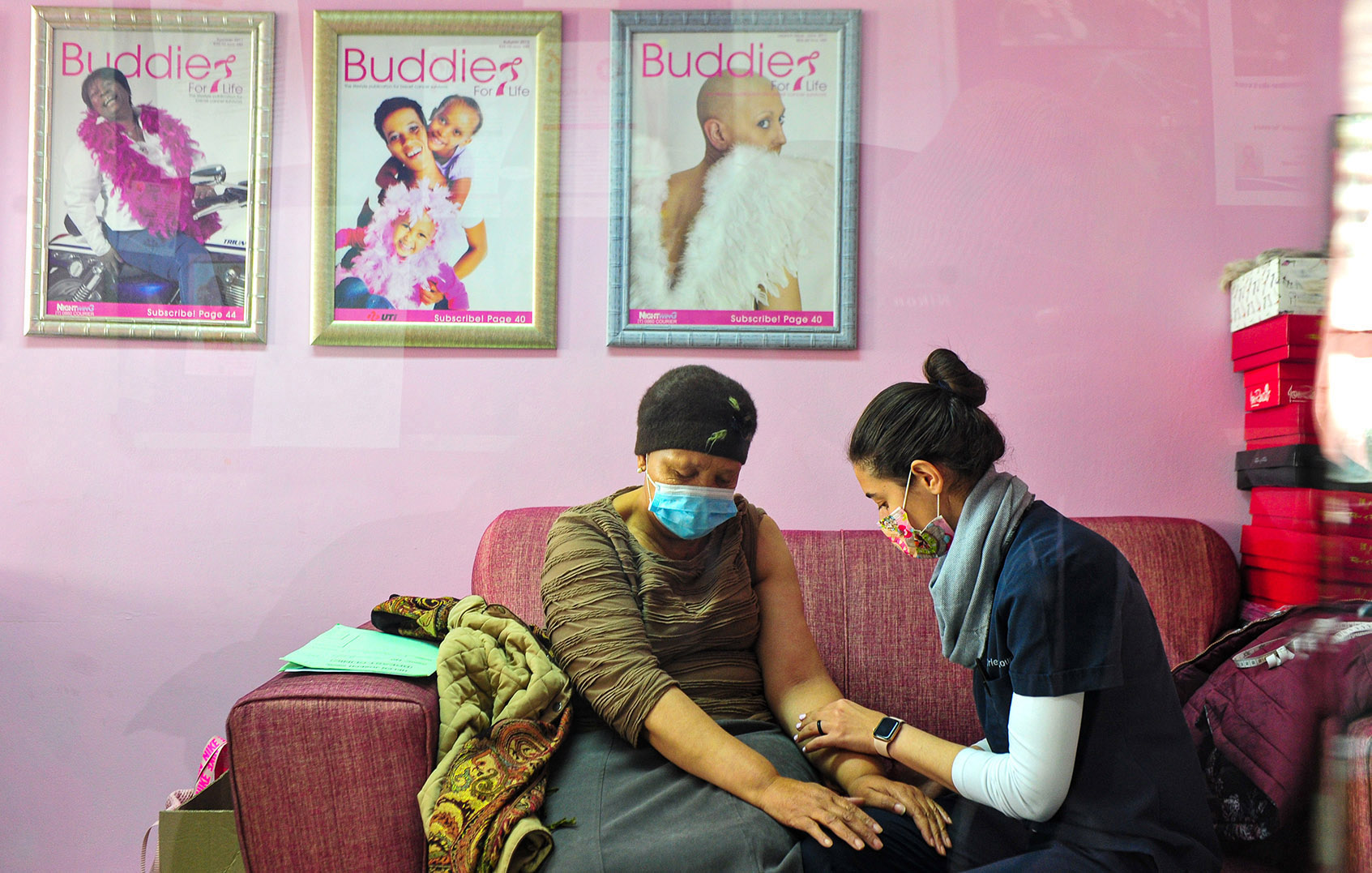
A patient receiving care at the Breast Clinic at Helen Joseph Hospital. (Photo: Rosetta Msimango / Spotlight)
Proposed alternative solutions
The cancer crisis task team came up with a number of alternative solutions to the cancer crisis, including:
- The establishment of a triage system;
- Rental of radiation machines;
- The appointment of additional personnel;
- Operating the functional machines overtime; and
- The outsourcing of radiation oncology services.
Following numerous meetings of the cancer crisis task team between April and September last year, the provincial health department conceded that the outsourcing of radiation oncology services is the only feasible temporary solution to eliminate the cancer backlogs but that it did not have the funds to support such a project. At this point, SECTION27 reached out to the national and provincial Treasury in an effort to determine whether there were any funds available for the realisation of this plan.
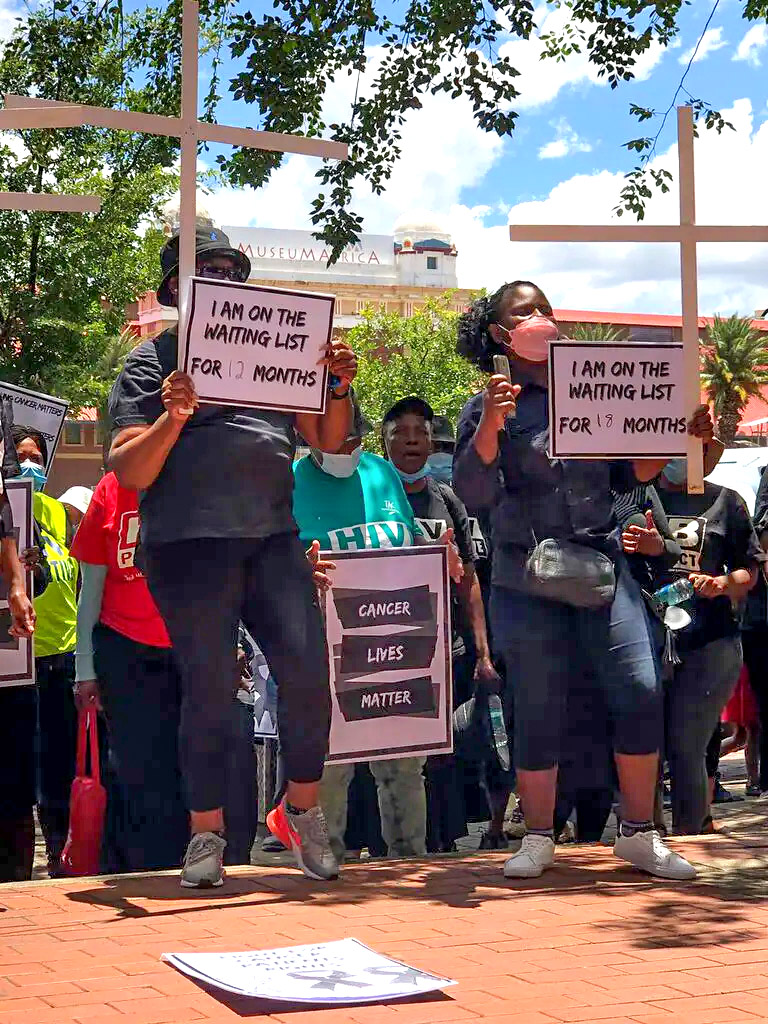
Gauteng Treasury in a presentation on the approach to address the backlogs estimated that for a backlog of 3,000 patients, radiation oncology services will amount to R225-million. (Photo: SECTION27 and Cancer Alliance / Spotlight)
The plan
Following a number of meetings between SECTION27, Cancer Alliance, the Gauteng Treasury, and the Gauteng Department of Health, the Gauteng Treasury came up with a plan to motivate for and secure funds to outsource radiation oncology services to private health facilities. This plan included representations made to the Office of the Premier and National Treasury. Both these institutions supported the plan.
It is important to note that similar outsourcing arrangements have been made with respect to radiation oncology services, including a temporary arrangement with the private sector at Livingstone Hospital in the Eastern Cape while their radiation oncology machinery was under maintenance.
Similar arrangements exist between Groote Schuur Hospital and Kimberley Hospital, with great success. All that remains to realise this plan in Gauteng, is for the provincial health department to update the waiting list created by Cancer Alliance, a task which has proven to be difficult for the department despite continued offers of support from Gauteng Treasury, SECTION27 and Cancer Alliance.
Without the updated waiting list, it will be impossible for Gauteng Treasury to release the funds set aside for this project and to negotiate with service providers, particularly as service providers will need information including types of cancer, their stages, and the number of patients.
It is also important to note that the outsourcing of these services is limited only to those persons already on the waiting list. It is designed as a temporary strategy to assist the provincial health department with the backlog in radiation oncology services. Gauteng Treasury is now also working with the provincial health department to expedite the procurement of outstanding radiation oncology machinery.
In February, the Gauteng Treasury in a presentation on the approach to address the backlogs estimated that for a backlog of 3,000 patients, radiation oncology services would amount to R225-million. The estimated cost for logistics was R20-million, bringing the total to R245-million. This would be in addition to the cost of procurement of the necessary machinery and equipment, required to provide radiation oncology in the ordinary course.
Mamabolo, in his budget speech, did not specify how much of the amount set aside (R784-million) will go towards radiation oncology backlogs.
Still, despite the inordinate delays by the Gauteng health department, the dedicated funding for the outsourcing project is welcomed. We are excited about what this will mean for the health rights of cancer patients and remain committed to providing input and guidance to ensure the implementation of the outsourcing project to alleviate this human rights crisis. DM
Khanyisa Mapipa is a health rights attorney at SECTION27. Salomé Meyer is an activist with Cancer Alliance.
This article was written by an employee of SECTION27. Spotlight is published by SECTION27, but is editorially independent — an independence that the editors guard jealously. The views expressed in this piece are not necessarily those of Spotlight.






















 Become an Insider
Become an Insider
I’m afraid that this is a sensational article but lacks factual integrity which is sad given the tragic situation. An example: therapists cannot be “promoted” to oncologists without studying for 12 years; these are completely different professions and competencies. The private oncology sector also lacks the capacity, efficiencies and resources to service public patients owing to the numbers of patients alone.
The situation in the hospitals of Gauteng arises because together with the Department of Health are crime scenes and focal points for looting by both the politicians and public servants. You have fire that destroyed the offices of the Department and Charlotte Maxeke and we have yet to hear the progress on the arson cases. They also sell posts in hospitals. The public health system is collapsing and the thieves are mouthing the National Health Insurance that is going to go through courts for the next twenty years. The thieves have crafted documents that would make the heist at Eskom a Sunday picnic to loot the National Health Insurance. They have lied to the public like in the land question led by the controversial Dr Sibongiseni Dlomo that the public will have access to private hospitals and care without paying. They cannot account for the public health budget that they are looting daily. Going to the public health system has become a death sentence for the poor and the availability of medicines is a lotto. Gauteng Department of Health and its hospitals requires detectives and Hawks to carry out investigations on numerous issues and billions lost. The situation at Coronation should have been an investigation on all public hospitals in Gauteng from Tembisa to Bara. If investigations are because of a medical doctor then we have a serious problem with Professor Makgoba as an Ombudsman who is sleeping on the job whilst the public suffers. BHeki Mlangeni is the worst.